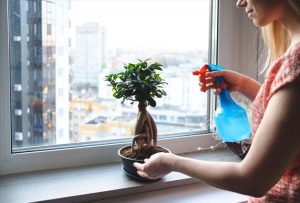
B is for Bonsai
B is for Bonsai 🌳 The word Bonsai is a Japanese word that means tree planting. Derived from the Chinese art form Penjing. But there
Humidifiers add moisture in the air in a number of ways. The process of humidification can happen by any one of the following ways: injecting steam, evaporating water, atomizing the water or air washing.

In the first method, steam is injected into the flow of water and instantly evaporates into a gaseous state, which increases the air's relative humidity without any temperature change.
In the second method, water is vaporized by placing a revolving drum in the path of air. The third method involves the heating of water by an electric, steam or hot water coil.
The temperature of the water is controlled by the quantity of steam supplied. In the fourth method, which is the air washing method, the temperature of the air decreases as high velocity water jets pass through the air.

The only thing to ensure is that the humidifier be cleaned regularly. A clean humidifier improves sleep by reducing the symptoms associated with dryness in the sinuses, nasal passages and throat. Humidity levels in the air must be kept at below 30 per cent. That will help in keeping the throat, mouth and skin moisturized.

Your respiratory system will give you the answer. If you wake up with a dry mouth and begin coughing with no apparent reason, it may be time to get a humidifier. A chronic runny nose, symptoms that resemble those of Hay fever, frequent nose bleeds, asthma and allergy flare-ups, sinus congestion and a generally dry throat are all indicators that you need a humidifier.

It increases the humidity in the air, moistens dry nasal passages and removes excess mucus so you breathe easier. It will also reduce inflammation and nasal congestion and prevent your cough from spreading to others. If you have seasonal allergies, Chronic Obstructive Pulmonary Disease (COPD), chronic bronchitis and emphysema, it may be helpful to get a humidifier.
A cool-mist humidifier is a device intended to disperse cool moisture into the air to increase the Humidity levels of a given space. But you might be wondering? Why do you even want to moist the dry air? What causes dry air? Don’t worry we have done the research for you to answer all this
As temperatures get lower during the colder winter season, humidity levels naturally drop. This is because cold air can’t retain as much moisture as warm air. Primarily, low indoor humidity is created when cold air, which carries a far lesser amount of moisture than warm air, enters the home and is heated, therefore lowering the atmosphere’s overall relative humidity. Low humidity can also occur in arid climates during summer as a result of excessive air conditioning, which removes moisture from the air as it operates. But should we even worry about this? Let’s find out what happens due to it?
The Environmental Protection Agency (EPA) recommends that you keep the humidity in your home or workspace between 30 and 50 per cent. When the air becomes drier than that, it raises the risk of several types of health issues.
Aside from these health issues, wood and plants also get affected by dry air. If your plants are turning brown even after your intense care. Then don’t blame yourself for it. It might be happening due to low humidity in your space.
But does having a humidifier even help the above health issues?
Think about the last time it rained. Do you remember how the air felt after the rain stopped? You may have noticed a “crisp” feeling in the air. A cool-mist humidifier has a similar effect to the temperature of your room. Humidifiers add moisture to the air, which can benefit people with respiratory symptoms or dry skin during the summer months especially if you live in a dry, desert climate. This can also be a benefit during colder months when indoor heating makes the air hot and dry.
If you need more moisture in the air in your home, then you need a humidifier. If you only want to add fragrance to the air, and no moisture, then a diffuser is the proper product. If you want to buy a diffuser the go-to Diffusers for Essential Oils Large Room, 500ml Aromatherapy Diffuser,7 Colors Changed

B is for Bonsai 🌳 The word Bonsai is a Japanese word that means tree planting. Derived from the Chinese art form Penjing. But there

Are you an introvert? If your personality has introversion then you would be termed as an introvert by Carl Jung, the psychiatrist who coined the

Summer delight A neck fan is a device that is worn around the neck to help fight the heat during summer. VIEW MORE BUY NOW
A cool-mist humidifier is a device intended to disperse cool moisture into the air to increase the Humidity levels of a given space. But you might be wondering? Why do you even want to moist the dry air? What causes dry air? Don’t worry we have done the research for you to answer all this.
As temperatures get lower during the colder winter season, humidity levels naturally drop. This is because cold air can’t retain as much moisture as warm air. Primarily, low indoor humidity is created when cold air, which carries a far lesser amount of moisture than warm air, enters the home and is heated, therefore lowering the atmosphere’s overall relative humidity. Low humidity can also occur in arid climates during summer as a result of excessive air conditioning, which removes moisture from the air as it operates. But should we even worry about this? Let’s find out what happens due to it?.
The Environmental Protection Agency (EPA) recommends that you keep the humidity in your home or workspace between 30 and 50 per cent. When the air becomes drier than that, it raises the risk of several types of health issues. dry skin irritated eyes dryness in the throat or airways allergies frequent coughs bloody noses sinus headaches cracked lips Aside from these health issues, wood and plants also get affected by dry air. If your plants are turning brown even after your intense care. Then don’t blame yourself for it. It might be happening due to low humidity in your space. But does having a humidifier even help the above health issues?
Think about the last time it rained. Do you remember how the air felt after the rain stopped? You may have noticed a “crisp” feeling in the air. A cool-mist humidifier has a similar effect to the temperature of your room. Humidifiers add moisture to the air, which can benefit people with respiratory symptoms or dry skin during the summer months especially if you live in a dry, desert climate. This can also be a benefit during colder months when indoor heating makes the air hot and dry.
If you need more moisture in the air in your home, then you need a humidifier. If you only want to add fragrance to the air, and no moisture, then a diffuser is the proper product. If you want to buy a diffuser the go-to Diffusers for Essential Oils Large Room, 500ml Aromatherapy Diffuser,7 Colors Changed